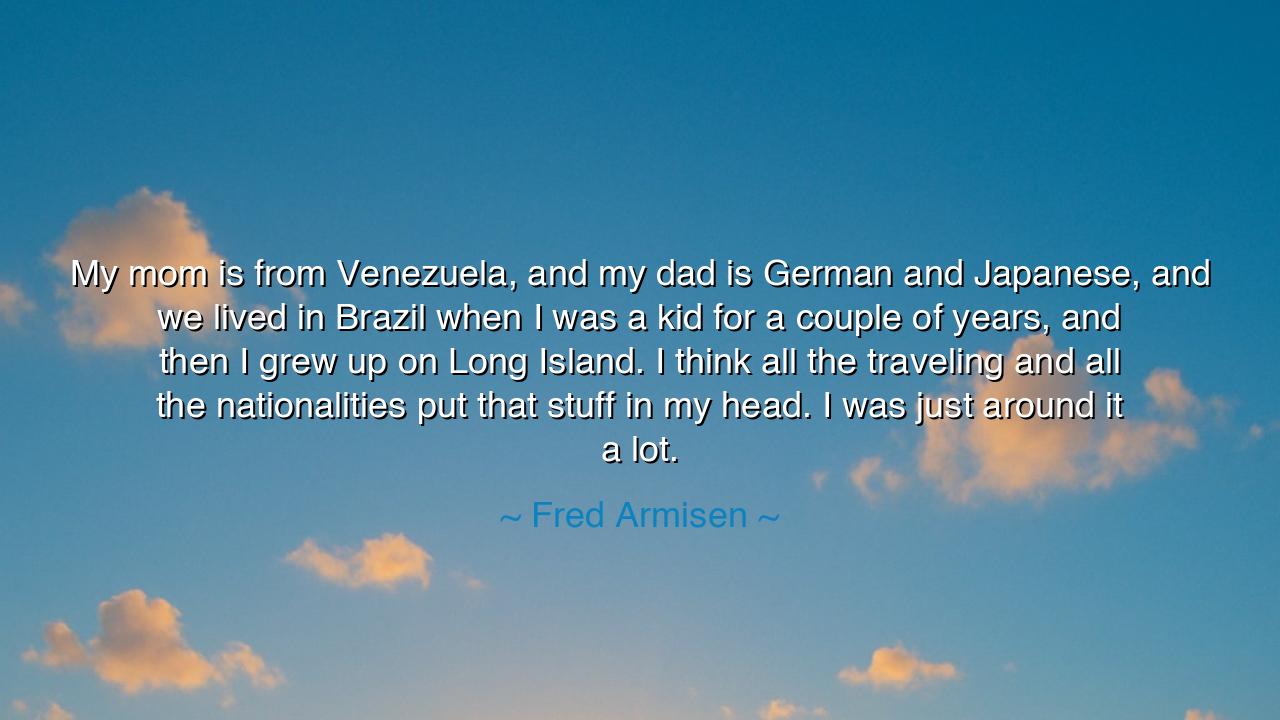
My mom is from Venezuela, and my dad is German and Japanese, and
My mom is from Venezuela, and my dad is German and Japanese, and we lived in Brazil when I was a kid for a couple of years, and then I grew up on Long Island. I think all the traveling and all the nationalities put that stuff in my head. I was just around it a lot.






Hearken, O seekers of wisdom, to the reflection of Fred Armisen, who recounts: “My mom is from Venezuela, and my dad is German and Japanese, and we lived in Brazil when I was a kid for a couple of years, and then I grew up on Long Island. I think all the traveling and all the nationalities put that stuff in my head. I was just around it a lot.” In these words lies a meditation upon heritage, cultural immersion, and the shaping of the mind through the tapestry of human experience. Armisen reminds us that the influences of many lands and peoples, when absorbed in youth, cultivate a richness of perspective and the seeds of creativity, empathy, and understanding.
From the earliest civilizations, the wise observed that exposure to diverse cultures expands the intellect and the spirit. In the courts of Alexander the Great, scholars and philosophers marveled at the fusion of Greek, Persian, and Egyptian ideas, understanding that a mind exposed to many worlds could think with breadth and depth. Armisen’s recollection mirrors this timeless principle: travel, immersion, and familial diversity plant the seeds of insight, enabling one to perceive the world with nuance and imagination.
The words illuminate the subtle but profound influence of environment and upbringing. To live in Venezuela, Brazil, and Long Island is to witness many customs, languages, and perspectives. Each experience contributes to a mental mosaic, shaping the child’s understanding of humanity. History offers countless examples: Marco Polo, journeying across Asia, absorbed the customs, languages, and wisdom of distant lands, later enriching Europe with insights that transformed commerce and thought. In Armisen’s words, we hear the echo of such early influence: exposure becomes education, and observation becomes knowledge.
The reflection also underscores the power of parental heritage in shaping identity. With a mother from Venezuela and a father of German and Japanese descent, Armisen grew amidst multiple traditions, values, and stories. Ancient philosophers recognized that the family is the first and most lasting teacher: the lineage of the mind, the rhythm of language, and the habits of thought are transmitted in these formative years. Armisen’s awareness — “I was just around it a lot” — reminds us that presence and immersion often teach more than formal instruction.
Consider the life of Leopold von Ranke, the historian, who traveled across Europe to study archives and documents in their native lands. His scholarship was enriched not only by books but by the immersion in the cultures, languages, and social customs he encountered. Similarly, Armisen’s exposure to multiple nationalities nurtured a flexibility of thought, an ability to empathize, and a wealth of ideas that would later manifest in creativity and expression.
From this reflection emerges a universal teaching: the richness of mind and spirit grows in proportion to the diversity of experience. To embrace multiple cultures, to witness different ways of living, and to internalize varied perspectives cultivates both wisdom and empathy. Armisen demonstrates that cultural and geographic diversity in childhood becomes a reservoir of imagination, understanding, and connection.
Practical counsel flows naturally: seek exposure to different peoples, languages, and traditions. Travel, study, and engage with others outside your immediate environment. Observe closely, reflect deeply, and absorb the rhythms and lessons of varied cultures. Even in small ways, such as books, conversation, or music, immersion broadens thought, nurtures creativity, and instills appreciation for the vastness of human experience.
Thus, O listener, let the words of Fred Armisen illuminate your journey: the mind is enriched by the diversity it encounters, and the heart grows through exposure to many worlds. By embracing heritage, travel, and cultural immersion, one cultivates wisdom, empathy, and creativity, preparing oneself to perceive and engage with the world in a manner both profound and imaginative. The tapestry of life, woven from many threads, becomes a source of enduring insight and inspiration.






AAdministratorAdministrator
Welcome, honored guests. Please leave a comment, we will respond soon